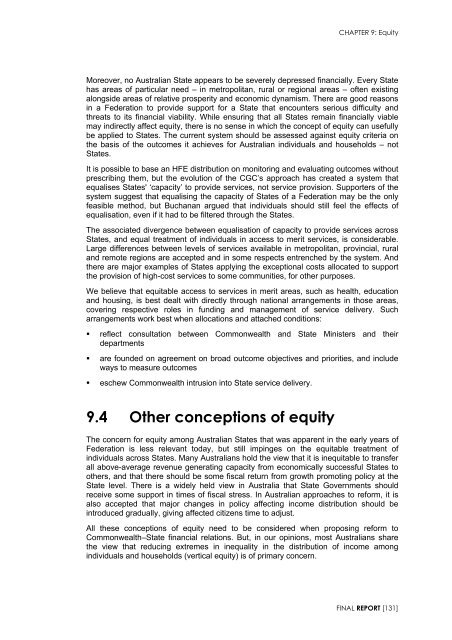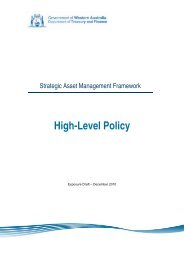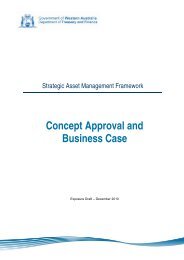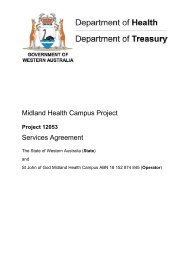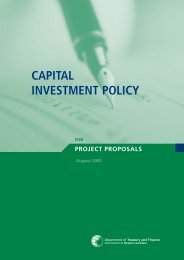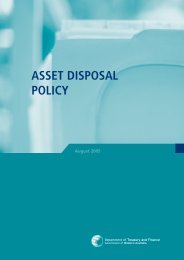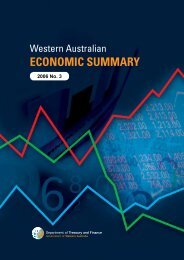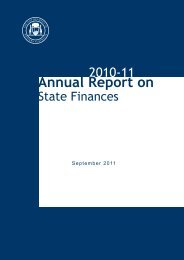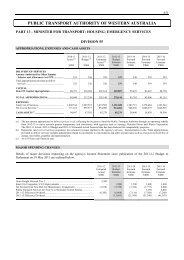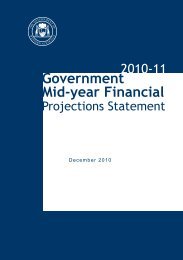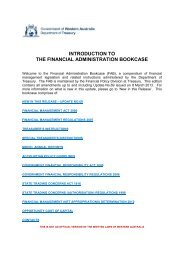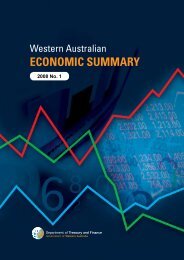Garnaut Fitzgerald Review of Commonwealth-State Funding
Garnaut Fitzgerald Review of Commonwealth-State Funding
Garnaut Fitzgerald Review of Commonwealth-State Funding
You also want an ePaper? Increase the reach of your titles
YUMPU automatically turns print PDFs into web optimized ePapers that Google loves.
CHAPTER 9: Equity<br />
Moreover, no Australian <strong>State</strong> appears to be severely depressed financially. Every <strong>State</strong><br />
has areas <strong>of</strong> particular need – in metropolitan, rural or regional areas – <strong>of</strong>ten existing<br />
alongside areas <strong>of</strong> relative prosperity and economic dynamism. There are good reasons<br />
in a Federation to provide support for a <strong>State</strong> that encounters serious difficulty and<br />
threats to its financial viability. While ensuring that all <strong>State</strong>s remain financially viable<br />
may indirectly affect equity, there is no sense in which the concept <strong>of</strong> equity can usefully<br />
be applied to <strong>State</strong>s. The current system should be assessed against equity criteria on<br />
the basis <strong>of</strong> the outcomes it achieves for Australian individuals and households – not<br />
<strong>State</strong>s.<br />
It is possible to base an HFE distribution on monitoring and evaluating outcomes without<br />
prescribing them, but the evolution <strong>of</strong> the CGC’s approach has created a system that<br />
equalises <strong>State</strong>s' ‘capacity’ to provide services, not service provision. Supporters <strong>of</strong> the<br />
system suggest that equalising the capacity <strong>of</strong> <strong>State</strong>s <strong>of</strong> a Federation may be the only<br />
feasible method, but Buchanan argued that individuals should still feel the effects <strong>of</strong><br />
equalisation, even if it had to be filtered through the <strong>State</strong>s.<br />
The associated divergence between equalisation <strong>of</strong> capacity to provide services across<br />
<strong>State</strong>s, and equal treatment <strong>of</strong> individuals in access to merit services, is considerable.<br />
Large differences between levels <strong>of</strong> services available in metropolitan, provincial, rural<br />
and remote regions are accepted and in some respects entrenched by the system. And<br />
there are major examples <strong>of</strong> <strong>State</strong>s applying the exceptional costs allocated to support<br />
the provision <strong>of</strong> high-cost services to some communities, for other purposes.<br />
We believe that equitable access to services in merit areas, such as health, education<br />
and housing, is best dealt with directly through national arrangements in those areas,<br />
covering respective roles in funding and management <strong>of</strong> service delivery. Such<br />
arrangements work best when allocations and attached conditions:<br />
• reflect consultation between <strong>Commonwealth</strong> and <strong>State</strong> Ministers and their<br />
departments<br />
• are founded on agreement on broad outcome objectives and priorities, and include<br />
ways to measure outcomes<br />
• eschew <strong>Commonwealth</strong> intrusion into <strong>State</strong> service delivery.<br />
9.4 Other conceptions <strong>of</strong> equity<br />
The concern for equity among Australian <strong>State</strong>s that was apparent in the early years <strong>of</strong><br />
Federation is less relevant today, but still impinges on the equitable treatment <strong>of</strong><br />
individuals across <strong>State</strong>s. Many Australians hold the view that it is inequitable to transfer<br />
all above-average revenue generating capacity from economically successful <strong>State</strong>s to<br />
others, and that there should be some fiscal return from growth promoting policy at the<br />
<strong>State</strong> level. There is a widely held view in Australia that <strong>State</strong> Governments should<br />
receive some support in times <strong>of</strong> fiscal stress. In Australian approaches to reform, it is<br />
also accepted that major changes in policy affecting income distribution should be<br />
introduced gradually, giving affected citizens time to adjust.<br />
All these conceptions <strong>of</strong> equity need to be considered when proposing reform to<br />
<strong>Commonwealth</strong>–<strong>State</strong> financial relations. But, in our opinions, most Australians share<br />
the view that reducing extremes in inequality in the distribution <strong>of</strong> income among<br />
individuals and households (vertical equity) is <strong>of</strong> primary concern.<br />
FINAL REPORT [131]


